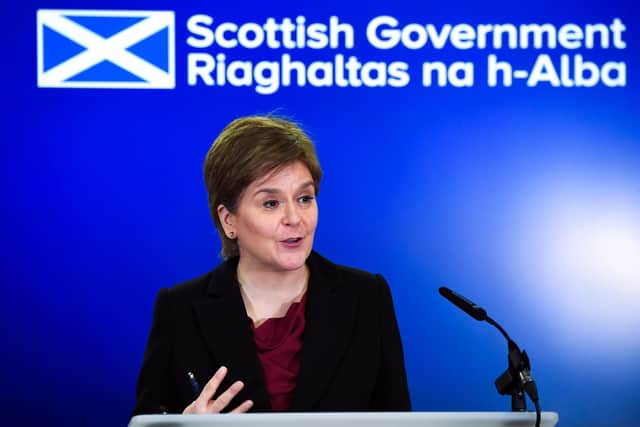Nicola Sturgeon hopes courts will clarify extent of UK Government's veto power over Holyrood laws
and live on Freeview channel 276
Nicola Sturgeon says testing the parameters of the UK Government's power of veto on Holyrood legislation in court would be in the public interest, claiming it can currently be used "on a whim".
Speaking to journalists on Monday, Nicola Sturgeon said her government was "looking at all options" to challenge the decision by Scottish Secretary Alister Jack to knock down gender reforms passed by MSPs last year. The Gender Recognition Reform (Scotland) Bill would make it easier for trans people to obtain a gender recognition certificate (GRC), but concerns were raised the process could be abused by predatory men.
Advertisement
Hide AdAdvertisement
Hide AdThrough Section 35 of the Scotland Act, Mr Jack has the power to block Bills he views as impacting on national security or other laws elsewhere in the UK, from receiving Royal Assent, a power he exercised last week. The First Minister vowed to fight the decision, with the next step likely to be a judicial review at the Court of Session in Edinburgh, but she would not say when a petition for review would be lodged with the court.


According to Ms Sturgeon, there was a public interest in the challenge, not only in the hopes of seeing the Bill passed into law, but to test the parameters of Section 35. "There is, I think, a real public interest in getting some judicial interpretation of Section 35 and what are the circumstances that it can be used, can't be used, what tests need to be passed, what evidence does the UK Government need to put forward."
She added: "Right now, as things stand, as was demonstrated last week, this is a power than can be used pretty much on the whim of the UK Government any time they have a political disagreement with the Scottish Government on a piece of legislation and they can find a spurious ground to invoke Section 35 – that seems to be what can happen." The First Minister also said she was worried the use of the provision for the first time in the near-25 year history of the Scottish Parliament could lead to it being used more often, citing the UK Government's repeated passage of legislation without the express consent of Holyrood, known as the Sewell convention, in recent years.
Ms Sturgeon also hit out at Mr Jack and UK equalities minister Kemi Badenoch after they declined invitations to give evidence on the decision. "I take the view that if you're going to outrageously and unacceptably ride roughshod over the democratically elected Scottish Parliament and seek to overturn decisions that the democratically elected Scottish Parliament has arrived at, you should at least have the guts to turn up and sit before a committee of the democratically elected Scottish Parliament and set out your reasons for doing so.” She added that the pair refusing to appear before committees shows "an absence of confidence they have in their own position".
Advertisement
Hide AdAdvertisement
Hide AdThe decision of Mr Jack to block the gender reform Bill has spurred conversation among legal experts, with former judge Lord Hope saying the statement of reasons from the UK Government was "devastating", while Lord Sumption said it was "powerful". But the First Minister said there had been a "range of legal views" expressed on the issue, pointing to former Lord Chancellor Lord Falconer as someone who voiced his opposition to the use of a Section 35 order. "You'll get that variety and division of legal opinion – ultimately only courts can decide," she said.